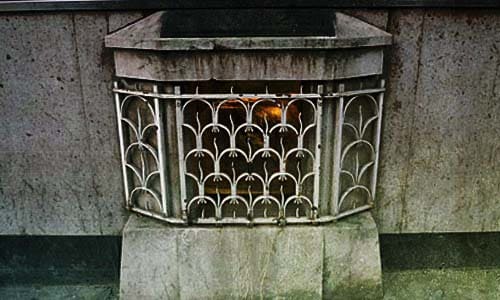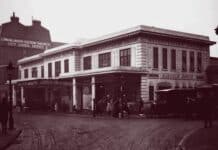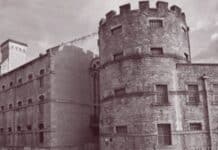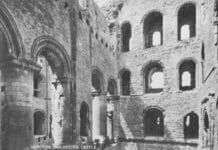JON KANEKO-JAMES tells us The London Stone is so crucial to the national’s health and prosperty!

The London Stone, most recently a feature in a Cannon Street cricket supplier, is now once more in danger as the building that houses it is under threat from redevelopment.
It isn’t much to look at: just a piece of scarred white stone with traces of mortar. Little would you know that should it be harmed, the whole country would be destroyed.
Mythologically, the stone is part of the founding of this nation.
When Brutus of Troy finished conquering Spain and decided to have a go at our rainy little island this stone was a part of the first altar he erected, which in turn was part of a stone circle originally erected on Ludgate Hill, somewhere near the site of where St Paul’s Cathedral stands today.
Which god Brutus had in mind when he set the altar stone is unknown, although not far from where the Stone Stands is the Mithraeum, an underground temple to the God Mithras which was found in the 18th Century.
And Mithras would be an appropriate deity for Brutus. Mithras is credited with slaying the Gavaevodata, the primordial bull, while Brutus slew the marauding giants he found terrorising the human populace of the British Isles.
He hunted and killed them ruthlessly, except the King, Gogmagog, and the good giants Gog and Magog, who acted as his personal bodyguards. Brutus brought a new age to Britain (which he named after himself,) making laws and growing the nation’s prosperity. Not only that, but the stone could be a lot more than just a former altar stone – it’s said that Mithras wasn’t born, but instead hatched from a stone.
Could the London Stone be a god’s egg?
Not only that, but the stone has a yet more famous and illustrious connection: it was the stone from which King Arthur pulled the sword Excalibur. Geoffrey of Monmouthshire attributes the London Stone as being the very same that Arthur drew his legendary sword, thereby proving himself a true king.
The stone was even used in real life trials until the 18th Century, the score marks on the top of the stone coming from where bogus or adulterated goods would be placed, to be smashed by a hammer for the benefit of the public.
Whatever the history of the London Stone, lets hope it stays safe, like the head of Bran the Blessed under the Tower of London, or the Tower’s famous Ravens, the Stone is one of the greatest mystic guardians the City has.








eh, what crap. would be a great article if you posted your sources. But you are piling mythology upon mythology. Its the first time I have ever even heard of the stone! You'd have better chance finding the Holy Grail. Its like reading an article from a mag for teens in the 70's…. Where's the evidence…. Fairy Tales…..
Forget the critics – this is good folklore, and without folklore we would have no culture! More power to ya!